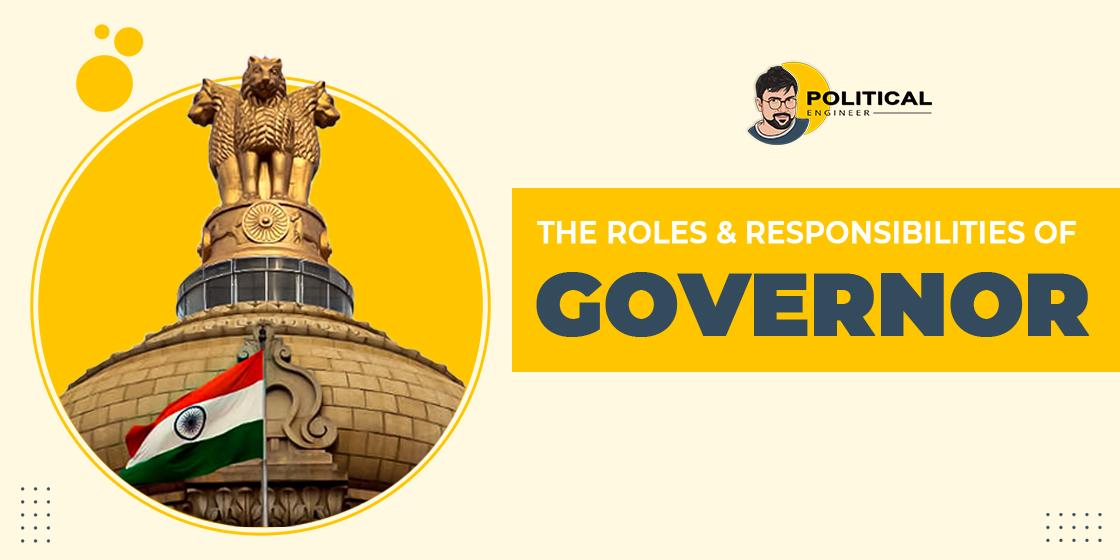The Advocate-General for the State is chosen by the Governor of each State from among those eligible to serve as judges of high courts.
In this article, we explain The 5 Important Roles and Responsibilities of the Governor. The Governor was the Constitutional head of State as a unit of the Indian Union
What Are Important Roles and Responsibilities of Governor
At the state level, the governors of India’s states have equal authority and responsibilities to the president of India. States have governors, and union territories like Delhi’s National Capital Territory (NCT) have lieutenant governors. The governor serves as the official head, although the chief ministers of the states and their councils of ministers hold the real power. He is chosen by the Indian president, who serves in that capacity at his or her discretion. Any Indian citizen who is older than 35 years old is eligible for appointment as governor. He is ineligible for any paid positions. He shouldn’t be a part of either the Union’s or the State’s Legislative Bodies (Article 168).
Website: https://en.wikipedia.org/wiki/168
Powers of Governor
The state’s governor will have judicial, legislative, financial, and executive responsibilities. However, he lacks the president of India’s diplomatic, military, and emergency powers.
Executive Powers
❖ The State Legislative Assembly’s majority supports the chief minister, who is appointed by the governor. On the chief minister’s recommendation, the governor appoints the other Council of Ministers members and assigns them ministries.
❖ The Council of Ministers continue to be in charge while the governor has “pleasure“, which actually refers to having a majority in the Legislative Assembly. The Council of Ministers is ineligible for removal so long as the State Legislative Assembly majority continues to back the administration.
❖ The governor appoints the chief minister of a state, the advocate general and the chairman and members of the State Public Service Commission. Apart from this, the state election commissioner is also appointed by the governor (though removed by the president). The president consults the governor in the appointment of judges of the High Courts and the governor appoints the judges of the district courts. All administrations carry on the governor’s name, and they also have the power to appoint staff for their tenure in class one and class four as per the constitution of India.
❖ The governor of the state by virtue of their office is also the chancellor of most of the universities in the state. The governor as chancellor of universities also acts as president of the Senate. The governor has the power to direct inspection of every component of the universities and affiliated colleges, requiring due action on the result of the inquiry. The governor accords consent of warrant of degrees and withdraws degrees or distinctions both at the recommendations of the Senate. The governor approves or disapproves statutes passed by the Senate and appoints teachers of the university based on the recommendation of the respective committees.
Legislative Powers
❖ Both houses of the state legislature are prorogued by the state head after being called to session. The state legislative assembly may even be dissolved by the governor. These are statutory powers, and the governor must follow the chief minister-led Council of Ministers’ recommendations when using them.
❖ If a bill is not a money bill, the governor may send it back to the state legislature for revision. The governor must, however, approve it if the state assembly sends it back to him a second time.
❖ The governor may enact ordinances when the state legislature is not in session and the governor determines that legislation is essential. The state legislature will receive these ordinances in its upcoming session. Unless they are approved earlier by the state legislature, they are only valid for six weeks from the date it reconvenes.
❖ Governor is empowered under Article 192 to disqualify a member of a House of the State legislature when the election commission recommends that the legislator is no longer complying with provisions of Article 191.
❖ According to Articles 165 and 177, the governor may request that the advocate general attend both houses of the state legislature’s sessions and alert them to any potential illegal activity.
Financial Powers
The yearly financial statement, which serves as the state budget, is presented to the state legislature by the governor. Furthermore, requests for grants may only be submitted on the governor’s advice. To cover any unforeseen expenses, they can also make advances from the state’s contingency fund. In addition, the state Finance Commission is created by the governor.
Discretionary Powers
The governor can use these powers are :
❖ When no party gets a clear majority, the governor has the discretion to choose a candidate for the chief minister who will put together a majority coalition as soon as possible.
❖ They can impose the president’s rule.
❖ They submit reports on their own to the president or at the direction of the president regarding the affairs of the state.
❖ They can withhold their assent to a bill and send it to the president for approval.
❖ During emergency rule per Article 353, the governor can override the advice of the council of ministers if specifically permitted by the president.
Get more interesting stuff on our official portal. Visit us on:


